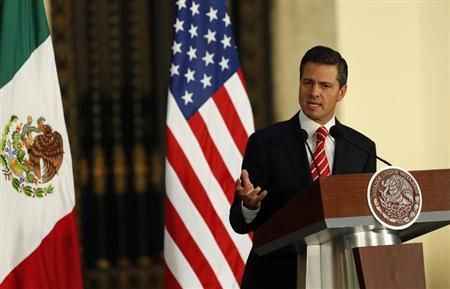
In provincial Mexican communities where drug cartels have for years operated with something akin to impunity, homegrown vigilante groups have begun to spring up, making arrests, staging public trials and dispensing punishment to alleged criminals without the involvement of the state. The groups say they are simply responding to necessity in a region where drug traffickers' infiltration into law enforcement agencies is common. Now the Mexican government has begun to crack down on the militias - often by legitimizing them. Watch a communique from one such vigilante group to the president of Mexico below.
The Star reported at the end of April that Mexican President Enrique Peña Nieto has said of the groups that "any practices that involve taking justice into one's own hands are acts outside of the law". He added that his government would fight the propagation of "self-defense" groups, which are now present in 13 of the country's 31 states. The groups are known to arrest police officers and soldiers - in the state of Michoacan, a militia captured 47 soldiers in response to a raid which had meant the arrest of 30 militiamen.
RELATED:
Carlos Slim's America Movil Will Buy US Mobile Phone Company
After Another Eruption from Popocatépetl, Should Residents Be Worried?
House 'Gang of Eight' Reaches Deal On Immigration Proposal
At the end of April, ten vigilantes were reported killed in a clash with Templars in the Michoacan town of Apatzingan. The Templars were armed with high-powered rifles and grenades.
That same week, the governor of the state of Guerrero - another hub of drug activity - signed an agreement with Bruno Placido, the leader of UPOEG (Union of Peoples and Organizations of the State of Guerrero), which gave legitimacy to the Union's 800-some vigilante members. The deal provided for training of the vigilantes by the Mexican army and forbids them from agitating from political causes and patrolling outside of their communities.
On Sunday, El Pais published an article describing conditions in La Ruana, a neighboring town of Apatzingan. In La Ruana, after a local militia rose up and drove out the Knights Templar cartel - with weapons suspected to be provided by a rival cartel - the Templars have tried to choke off the town's life. Distributors of medicine and gas, companies as predominant as Coca-Cola or Bimbo, refuse to enter the town limits out of fear of reprisal from the Templars. Hipólito Mora, the militia's 58-year-old chief, told El Pais,
"This is a movement of the poor. We just want them to leave and let us work. We're not waging a war, we're only defending ourselves, and this isn't going to end even if they kill me. We've been abandoned. To the State it's like we don't exist. The municipal governments were with them and the governor here acts like nothing's happening."
The main business for the cartels in Michoacan is methamphetamine, which they churn out in labs nestled in the mountains.
© 2025 Latin Times. All rights reserved. Do not reproduce without permission.




